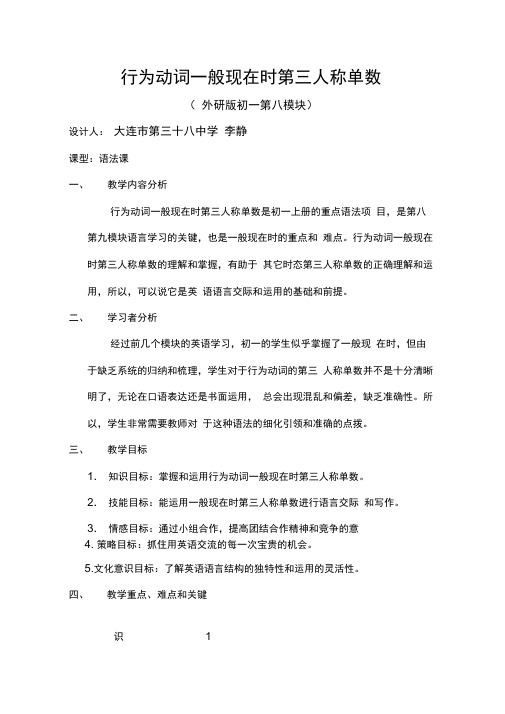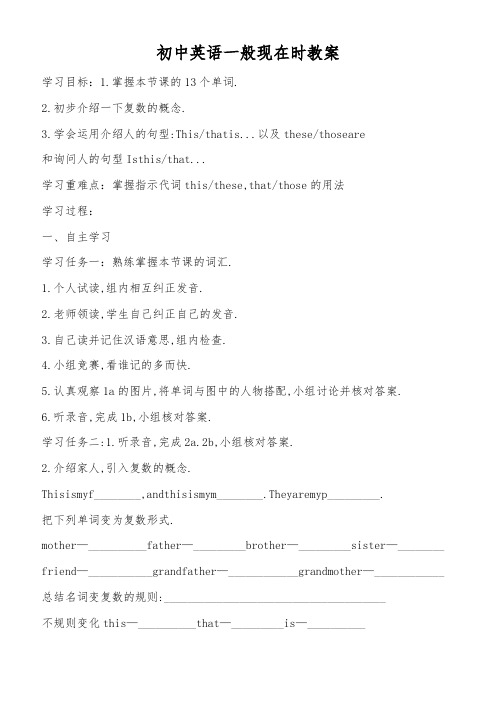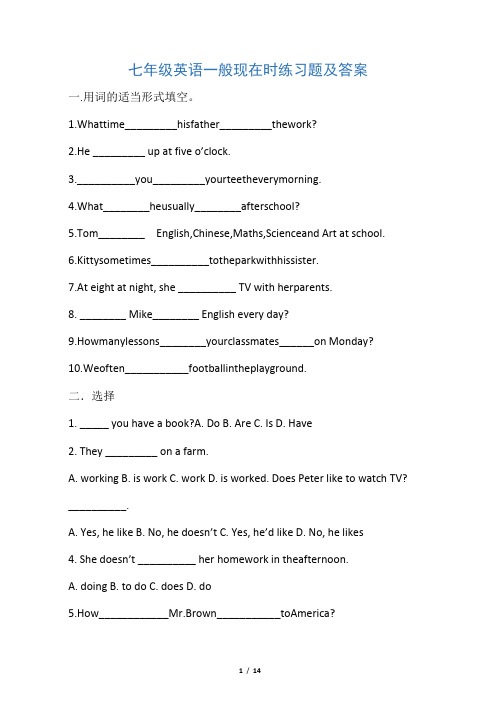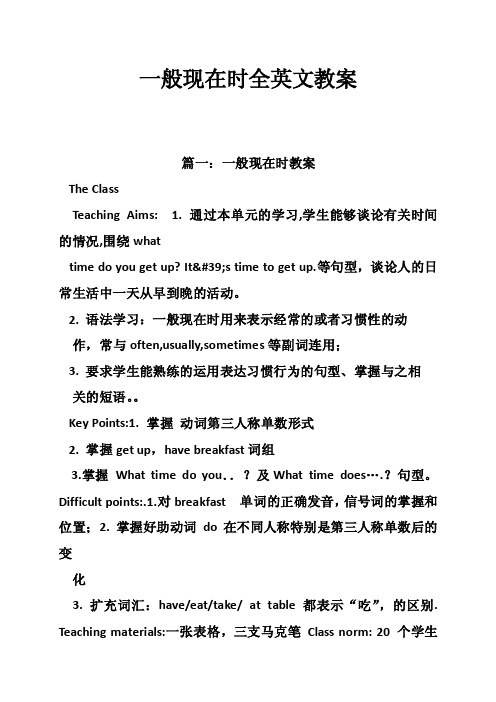初一英语一般现在时习题(完整)教案资料
一般现在时态教案-+2024-2025学年人教版英语七年级上册

必考语法--一般现在时态以及练习 2024-2025学年人教版英语七年级上册主备人备课成员教学内容本节课为人教版英语七年级上册的必考语法--一般现在时态以及练习。
课程主要内容围绕一般现在时态的构成、用法及动词的三单形式变化规则进行讲解,并通过练习巩固所学知识。
具体内容包括:1. 一般现在时态的构成:主语+动词原形(be动词/行为动词)+其他。
2. 一般现在时态的用法:描述习惯性动作、普遍真理、客观事实等。
3. 动词的三单形式变化规则:a. 以字母s结尾的动词,直接在词尾加上es,如:play->plays。
b. 以字母sh、ch、th结尾的动词,在词尾加上-es,如:watch->watches。
c. 以辅音字母+元音字母结尾的动词,在词尾加上-es,如:go->goes。
d. 以元音字母+辅音字母结尾的动词,在词尾加上-s,如:do->does。
4. 练习:完成教材P44-45的练习题,巩固一般现在时态及动词三单形式的运用。
核心素养目标本节课旨在培养学生的英语学科核心素养,主要包括语言能力、文化意识、思维品质和学习策略。
通过学习一般现在时态的构成、用法及动词的三单形式变化规则,学生能够更好地运用英语描述日常生活中的事物和行为,提高语言运用能力。
同时,通过练习题的完成,培养学生的思维品质,提高他们分析问题和解决问题的能力。
此外,学生还能通过学习英语语法,了解西方文化背景,增强文化意识。
为了提高学习效果,教师将引导学生运用恰当的学习策略,如合作学习、任务型学习等。
学习者分析1. 学生已经掌握了哪些相关知识:学生在之前的英语学习中,已经掌握了简单的英语词汇和基本的日常交流用语。
他们对英语有一定的认识,能够进行简单的英语对话。
此外,学生已经学习了动词的一般过去时态,对时态的概念有一定的了解。
2. 学生的学习兴趣、能力和学习风格:七年级的学生对新鲜事物充满好奇,具有较强的学习兴趣。
七年级英语《一般现在时第三人称单数作主语的疑问句及其回答》教案

当主语是第三人称单数,表示经常性、习惯性的行为时,我们这样表达:She speaks English. He lives far away from school.如果表示不常做某事,该怎样表达呢?She doesn’t speak English.她不说英语。
He doesn’t live far away from school . 他住地离学校不远。
你能总结出什么呢?主语是第三人称单数的行为动词的一般现在时否定形式是在行为动词前加doesn’t (does not ),这时要注意把谓语动词还原为动词原形。
试比较肯定与否定句中行为动词形式的变化:肯定:He gets up very early. 他起床很早。
否定:He doesn’t get up very early. 他起床不很早。
如果要问别人是否经常做某事,我们要采用下面的表达方式:—Does the panda eat meat? 熊猫吃肉吗?—No, it doesn’t. 不,它不吃。
—Does it eat bamboo? 它吃竹子吗?—Yes, it does. 是的,吃。
从以上例子可以看出,行为动词的第三人称单数一般现在时疑问形式是在句首加助动词does ,而加does之后,后面的谓语动词像否定句一样也要用原形。
试比较:肯定:He gets up very early. 他起床很早。
疑问:Does he get up very early? 他起床很早吗?现在把行为动词第三人称单数的各种句式总结如下:肯定句:主语+动词的第三人称单数形式否定句:主语+doesn’t +动词原形疑问句:Does+主语+动词原形?肯定回答:Yes, 主语+does.否定回答:No, 主语+ doesn’t.Quiz一、用括号内所给动词的适当形式填空1. The monkey ________ (like) bananas.2. Lucy ___________ (not visit) Japan.3. _________ Tiger _________ (live) in the wild in China?4. The worker _________ (give) the lion ten kilos of meat a day.5. Where ________ the wolf ________ (come) from?二、句型转换。
(完整版)一般现在时教案

行为动词一般现在时第三人称单数(外研版初一第八模块)设计人:大连市第三十八中学李静课型:语法课一、教学内容分析行为动词一般现在时第三人称单数是初一上册的重点语法项目,是第八第九模块语言学习的关键,也是一般现在时的重点和难点。
行为动词一般现在时第三人称单数的理解和掌握,有助于其它时态第三人称单数的正确理解和运用,所以,可以说它是英语语言交际和运用的基础和前提。
二、学习者分析经过前几个模块的英语学习,初一的学生似乎掌握了一般现在时,但由于缺乏系统的归纳和梳理,学生对于行为动词的第三人称单数并不是十分清晰明了,无论在口语表达还是书面运用,总会出现混乱和偏差,缺乏准确性。
所以,学生非常需要教师对于这种语法的细化引领和准确的点拨。
三、教学目标1.知识目标:掌握和运用行为动词一般现在时第三人称单数。
2.技能目标:能运用一般现在时第三人称单数进行语言交际和写作。
3.情感目标:通过小组合作,提高团结合作精神和竞争的意4. 策略目标:抓住用英语交流的每一次宝贵的机会。
5.文化意识目标:了解英语语言结构的独特性和运用的灵活性。
四、教学重点、难点和关键识11.教学重点:行为动词一般现在时第三人称单数的结构体系和正确运用。
2.教学难点:行为动词一般现在时第三人称单数运用于交际和表达。
3.教学突破的关键:a. 采用多媒体教学,运用形象的图片和彩色字体的强化; b. 采用顺口溜的形式,提高学生的学习兴趣,强化学生的记忆; c. 小组合作,取长补短,共同完成学习任务。
五、教学步骤与设计意图1. Pre-teaching课前播放大屏幕图片和歌曲the school day, 让学生在轻松和愉快的氛围下进入语法的学习。
Students stand up and greet ,Not sittingdown ,the teacher gets the students to talk about“ My school day ”in pairs ,设计意图:激情引趣,为上课创造良好的学习氛2. Homework checking(share )Get the Volunteers to share “Myschool day” with the class 设计意图:检查作业,为下面的第三人称单数的语言交际打好基础,基础好的学生可以对第三人称单数有少量的使用3. PresentationA. Question and answer23 The teacher:我们以上的交流运用了什么时态?The students:学生回答:一般现在时.The teacher:你怎样理解这种时态?The students: —般的状况或经常发生的动作.The teacher:我们现在学习了几种动词的一般现在时呢?The stude nts:系动词,情态动词和行为动词;(学生在 回答时,答案可能有偏差,教师作好引领)The teacher shows the senten ces on the scree n:a. Tom is from En gla nd.b. He can speak English very well.c. We often get up at six every day.The students: a. 动词用原形b.主语是第三人称单数时,动 词加s .The teacher: 什么样的词和短语是第三人称单数?B. words and phrases The teacher : 我们发现行为动词一般现在时的运用有几种情 She ofte ngets up at six.况?细节掌握、快速反映1:从下面的单词和短语中找出第三人称单数(在题号前划v )1). my friend 7). the boy 's parents2). our teacher 8). your teachers3). your name 9). our class4).their brother 10). Tom and Lucy5). her pens 11).the chair6). Lucy and Lily 's parent 12). DaMing with his parents与学生研究为什么1 ).2).3).4).6).9).11).12) 是第三人称单数,而其他的不是第三人称单数。
初中英语一般现在时教案

初中英语一般现在时教案学习目标:1.掌握本节课的13个单词.2.初步介绍一下复数的概念.3.学会运用介绍人的句型:This/thatis...以及these/thoseare和询问人的句型Isthis/that...学习重难点:掌握指示代词this/these,that/those的用法学习过程:一、自主学习学习任务一:熟练掌握本节课的词汇.1.个人试读,组内相互纠正发音.2.老师领读,学生自己纠正自己的发音.3.自己读并记住汉语意思,组内检查.4.小组竞赛,看谁记的多而快.5.认真观察1a的图片,将单词与图中的人物搭配,小组讨论并核对答案.6.听录音,完成1b,小组核对答案.学习任务二:1.听录音,完成2a.2b,小组核对答案.2.介绍家人,引入复数的概念.Thisismyf________,andthisismym________.Theyaremyp_________.把下列单词变为复数形式.mother—__________father—_________brother—_________sister—________ friend—___________grandfather—____________grandmother—____________总结名词变复数的规则:______________________________________不规则变化this—__________that—_________is—__________学习任务三:熟练运用介绍人的句型:This/thatis以及These/thoseare和询问人的句型Isthis/that┅1、看图片1a,引入:ThisisDave.Thisishissister.2、用This is┅Theseare┅句型依次介绍Dave的其他家人。
3、小组竞赛看谁介绍的最多.二、合作共建小组讨论:远处的人应如何介绍?三、系统总结总结如何介绍自己的家人.四、诊断评价(一)英汉互译hisfriends___________theseboys___________hergrandmother____________你的父母亲___________他的妹妹们____________那些女孩们____________(二)选择1.Thesearemy_______________.AfatherBmotherCparentsDparent2.This______ZhaoLin,MissBrown.AisBareCamCyour3.Thisis_______apple.Thoseare___________.Aa,bananaBan,bananaCan,bananaDa,bananas(三)用单词的适当形式填空.1.Look,thisis_________(I)mother.2.Thesearehis________(parent).3.Hisfather_____(be)ateacher.4.Myfriends_____(be)students.【中考连接】(四)据句意和汉语填空.1.Myfatherandmymotheraremy_________.2.Thisismysister.______nameisMary.3.Whatarethese?Theyare________.(苹果)4.Thosearemy_________(弟弟们).5.Yourmother'smotherisyour__________.(五)汉译英1、这些是你的朋友吗?Are________________________________?2、那些是他们的尺子吗?不,不是.__________________their__________?No,_______________.五、课后反思通过本节课的学习,我的收获是_________________________________.感到自己有待加强的_____________________________________________.初中英语一般现在时教案2教学目标(一)知识1. 掌握如何谈论自己的爱好和询问他人的爱好:want, and, but, like, Do you want to …? Yes, I do./No, I don't. What kind of movies do you like? I like …2. 掌握相关的电影词汇:action movie, romance, thriller, comedy3. 掌握一些品质形容词并能用之表达喜爱或讨厌某一事物的理由:fun, great, scary, funny, exciting, sad, I think …(二)能力能了解电影的基本知识。
(完整)七年级英语一般现在时练习题及答案

七年级英语一般现在时练习题及答案一.用词的适当形式填空。
1.Whattime_________hisfather_________thework?2.He _________ up at five o’clock.3.__________you_________yourteetheverymorning.4.What________heusually________afterschool?5.Tom________ English,Chinese,Maths,Scienceand Art at school.6.Kittysometimes__________totheparkwithhissister.7.At eight at night, she __________ TV with herparents.8. ________ Mike________ English every day?9.Howmanylessons________yourclassmates______on Monday?10.Weoften___________footballintheplayground.二.选择1. _____ you have a book?A. Do B. Are C. Is D. Have2. They _________ on a farm.A. workingB. is workC. workD. is worked. Does Peter like to watch TV? __________.A. Yes, he likeB. No, he doesn’tC. Yes, he’d likeD. No, he likes4. She doesn’t __________ her homework in theafternoon.A. doingB. to doC. doesD. do5.How____________Mr.Brown___________toAmerica?A. do,goB. is,goC. does,goD. does,goes6. Where’s my camera? I____________ it.A. am not finding B. am not seeing C. can’t findD. can’t look at7. How ___________ he go to work?He ___________ to work by bike.A. does ;goB. do;goesC. do ;goD. does;goes8. ______ you usually late for school?No, _____________.A.Do;IamB.Does;notC.Are;I’mnotD.Are;I aren’t9. _____ she _____ home at six every day?A. Is , leave B. Does ,leave C. Is , leaves D. Does , left10. Mr. Yang ____________ English thisterm.A.teachesourB.teachesusC.teachsusD.teachour答案:一.1.does, do. gets. Do, brush. does, do.studies. goes. watches. Does, read. do, have 10. play二.1---A C B D C ---10 C D C B B一般现在时练习题用所给词的正确形式填空1. We often___________ on the playgound.2. He _________ up at six o’clock.3.__________you_________yourteetheverymorning.4. What____ he usually _____ after school?5.Danny_______English,Chinese,Maths,Scienceand Art at school.6.Mikesometimes__________totheparkwithhissister.7. At eight at night, she ________ TV with hisparents.8. ________ Mike________ English every day?9. How many lessons ______your classmate____ onMonday?10.Whattime____hismother_________thehousework?11. He often ______ dinner at home. 12. Danieland Tommy___ in Class One.13. We____ TV on Monday. 14. Nick _____ to thezoo on Sunday.15. They______ the World Cup?16. What ____theyoften ____ on Saturdays17. Your parents________ newspapers every day?18. The girl______ us English on Sundays.19.SheandI_______awalktogethereveryevening.20. There_______ some water in the bottle. 1.Mike ______ cooking.22.They_______ thesamehobby.23.Myaunt______after her baby carefully.24.Youalways____ yourhomeworkwell.25.I_____ill. I’m staying in bed.26. She_____ to school from Monday to Friday.7.Liu Tao _____ not like PE.28. The child often______ TV in the evening.29. Su Hai and Su Yang ______ eight lessons thisterm.0.-Whatday______ittoday?-It’sSaturday.31. Don’t make a noise. Grandpa __________.32. Tom’s family__________ TV.33.It________metwohourstofinishmyhomeworklast night.34.What______yourmother_______everyevening?She _______ clothes.35. _______ it ______ every day?36. What _______ you _______ on Sundays ? We________ football.37. There ________ a football match on TV everymorning.38. They often ________ the Great Wall.39. Who _______ the best in your class?40. He _____________ .41. The earth __________ round the sun.4She ________ a sweater.43. Mr. Wang often______ to Shanghai.改句子1. Do you often play football after school?2. I have many books.3. Gao Shan’s si ster likes playing table tennis4. She lives in a small town near New York.5. I watch TV every day.6. David has a goal.7. We have four lessons.8. Nancy doesn’t run fast9. My dog runs fast.10.11.12.13.14.写出下列动词的第三人称单数形式:1.wash_________match_______guess______study______finish_________go__ ______snow______carry_________2.stop______see________drive________let_______carry______keep_____join ______find_______ think________ teach______catch______3.stay_______begin______forget_______forget______lie________die_ ______run_______prefer______give________ring_______dance______hope______ _单项选择:1. There _____ an English film at the cinema now.A. will have B. is going to haveC. is going tobeD. is2. The picture _______ nice.A. looksB. is lookedC. lookD. is looking3. She ______ down and soon falls asleep.A. live B. lain C. laid D. sits4. They _____ the office in time very morning.A. reach to B. arrived C. went D. get to5. We shall go to Shanghai on business before you_____ back next week.A. will comeB. cameC. would comeD. come6. The plane ______ over there.A. isB. areC.amD. was7. I see her ____ the room this morning.A. to enterB. enteredC. enter D. enters8. The teacher ________us to come to school ontime.A. askB. asking C. asksD. asked9. John always ______ others.A. helpB. helpingC. helpsD. to help10. He ______for eight hours every day.A. workingB. to workC. worksD. worked11. You’d better ______ at home and ______ yourhomework.A. to stay, doB. stay, doC. to stay, to doD.stay, to do12. He sits down and ______ a rest.A. havingB. haveC. to haveD. has13. Uncle Wang never ______ a cake.A. makeB. to makeC. makingD. makes翻译1.他在第三小学上学。
一般现在时全英文教案

一般现在时全英文教案篇一:一般现在时教案The ClassTeaching Aims: 1. 通过本单元的学习,学生能够谈论有关时间的情况,围绕whattime do you get up? It's time to get up.等句型,谈论人的日常生活中一天从早到晚的活动。
2. 语法学习:一般现在时用来表示经常的或者习惯性的动作,常与often,usually,sometimes等副词连用;3. 要求学生能熟练的运用表达习惯行为的句型、掌握与之相关的短语。
Key Points:1. 掌握动词第三人称单数形式2. 掌握get up,have breakfast词组3.掌握What time do you..?及What time does….?句型。
Difficult points:.1.对breakfast 单词的正确发音,信号词的掌握和位置;2. 掌握好助动词do在不同人称特别是第三人称单数后的变化3. 扩充词汇:have/eat/take/ at table都表示“吃”,的区别. Teaching materials:一张表格,三支马克笔Class norm: 20 个学生气氛较活跃。
Culture aims: 本单元的核心教学项目是“习惯性为”,即用英语询问某个人物的职业在不同时间的活动的语言。
教育学生询问他人的时候用句型what time do you get up?要求学生掌握好助动词do在不同人称特别是第三人称单数后的变化。
通过学习本单元内容使学生了解人在不同时间所作的事情。
Contents:Step 1. Greeting and warm up/ review.T:Hello boys and girls ,how are you today ? S: I am …. Step 2. lead-in.T:Tell me ,how was your weekend ? happy or soso ? What time do you get up ?S:7点,六点T: Give me the whole sentence,I usually get up at 6 o’clock everyday. S: I get up at…T:个体操练,问一个S, What time do you go to school..?S: I usually go to school at …(把这个问题和回答板书) T: 整体操练,问全班What time does she/he go to school..? S: She usually goes to school at …(把这个回答和问题板书)Step 3. Presentation.T:今天我们学习的是一般现在时的第一种情况,就是一般现在时表示经常发生的动作或经常存在的状态日常行为习惯。
初一英语一般现在时习题培训课件
一般现在时基本句式:1.含be动词的一般现在时结构:肯定句:主语+ be+ 其它。
否定句:主语+ be+not + 其它。
一般问句:Be+主语+ 其它?2.含实义动词的一般现在时结构:(1)主语非三单:肯定句:主语+动词原形+其它。
否定句:主语+don't+动词原形+其它。
一般问句:Do+主语+动词原形+其它?肯定回答:Yes,主语+do. 否定回答:No,主语+don’t(2)主语三单肯定句:主语+动词三单形式+其它。
否定句:主语+doesn't+动词原形+其它。
一般问句:Does+主语+动词原形+其它?肯定回答:Yes,主语+does. 否定回答:No,主语+doesn’t一、写出下列动词的单三形式:(一)1.go__________2. catch _________3. brush_________4. wash___________5. do________6. like________7. have___________8. watch ___________9. drink ___________ 10.fly___________ 11.say___________ 12.learn ___________ 13.eat___________ 14.read___________ 15.sing___________ brush________(二)study_______ stay _____ make ___look ____ pass____ carry ____ come_______ watch_____ plant______ teach_______二、用括号内动词的适当形式填空。
(一)1. We often___________(play) in the playgound.2. He usually _________(get) up at six o’clock.3.__________you_________(brush) your teeth every morning.4. What (do) he usually (do) after school?5. Danny (study) English,Chinese,Maths,Science and Art an school.6. Mike sometimes __________(go) to the park with his sister.7. At eight at night, she __________(watch) TV with his parents.8. ________ Mike________(read) English every day?9.How many lessons_________your classmate________(have) on Monday?10. What time_________his mother_________(do) the housework?(二)1. He often ________(have) dinner at home.2. Daniel and Tommy _______(be) in Class One.3. We _______(not watch) TV on Monday.4. Nick _______(not go) to the zoo on Sunday.5. ______ they ________(like) the World Cup?6. What _______they often _______(do) on Saturdays?7. _______ your parents _______(read) newspapers every day?8. The girl _______(teach) us English on Sundays.9. She and I ________(take) a walk together every evening.10. There ________(be) some water in the bottle.11. Mike _______(like) cooking.12. They _______(have) the same hobby.13. My aunt _______(look) after her baby carefully.14. You always _______(do) your homework well.15. I _______(be) ill. I’m staying in bed.16. She _______(go) to school from Monday to Friday.17. Liu Tao _______(do) not like PE.18. The child often _______(watch) TV in the evening.19. Su Hai and Su Yang _______(have) eight lessons this term.20. -What day _______(be) it today?-It’s Saturday.(三)1 I can take Li Ming there when he _____ ( come) to visit.2 _____your sister_____(know)English?3Her home____ _____ ______(远离)her school.4The pot_____(not look) like yours very much.5 Where _____you____(have)lunch every day?6 Who_____(想要)to go swimming?7 ______she_____(do) the housework every day?8 Jenny and Danny usually______(play) games in the afternoon(四)1.Where (be) John and Jack from?2. His favourite subjects (be) P.E. and music.3. His pen pal (live) in Toronto.4. he (have) any sisters?5. Ben can (speak) English and Spanish.6. Her brother (not play) sports every day, he only (watch) them on TV.7. My patents want (go) shopping on Sunday.8. She likes (play) computer games.9. When your mother (cook) breakfast every morning?10. There (be) some ice cream and hamburgers on the table.11. Mr White always (get) up early in the morning.12. Jack, together with his friends, (go) to park every week.13. Nick (have) lunch at school from Monday to Friday.14. There (be) seven days in a week.15. The students in our school (like) English.二、选择填空:( )1. I ________to school at 7:00 in the morning.A. goB. goingC. goes( )2. They _______books every day in the library.A.readsB. readC. reading( )3. The monkey________ eating bananas very much.A.likeB. likesC. liking( )4. My father ________to read newspaper after supper every day.A.likeB. likesC. liking( )5. I like watching TV, but my mother _________like it.A. don’tB. doesn’tC. does( )6. ____________ your father drink milk every day?A.doB. areC. does(二)()Jenny ____ in an office. Her parents ____in a hospital.A work worksB works workC work are workingD is working work ()One of the boys_____ a black hat.A haveB there isC there areD has()We will go shopping if it____ tomorrow.A don't rain Bdidn't rain Cdoesn't rain Disn't rain()He said the sun ____in the east and ____in the west.A rose; setB rises; setsC rises, setD rise; sets()Wang Mei ____ music and often ____ to music.A like; listenB likes; listensC like; are listeningD liking ; listen ()Jenny____ English every evening.A has studyB studiesC studyD studied改错(划出错误的地方,将正确的写在横线上)1. Is your brother speak English? __________________2. Does he likes going fishing? __________________3. He likes play games after class. __________________4. Mr. Wu teachs us English. __________________5. She don’t do her homework on Sundays. _________________把下列句子变成一般疑问句(并作肯定和否定回答)、否定句1.I like cooking.2.My friends like playing soccer.3.Lily and Lucy read comic books every day.4.I drink tea in the morning.5.The bird likes singing.6.May and David climb mountains every week.7.My aunt likes to go fishing.8.They speak English every day.9.Daniel watches TV every evening10.I do my homework every day11.She likes milk12.Amy likes playing computer games.13.We go to school every morning.14.He speaks English very well.15.I like taking photos in the park.16.John comes from Canada.17.She is always a good student.(二)1. Do you often play football after school?2. I have many books.3. Gao Shan’s sister likes playing table tennis4. She lives in a small town near New York.5. I watch TV every day.6. David has got a goal.7. We have four lessons.8. Nancy doesn’t run fast9. My dog runs fast.10.Mike has two letters for him.11. I usually play football on Friday afternoon.12. Su Yang usually washes some clothes on Saturday.13. David usually waters the flowers every day14. Tom does his homework at home.。
教案(讲义):初一英语:一般现在时_(讲解和练习题)
动词和时态一般现在时一、导入二、(1)专题讲解☆专题1:动词和时态概述实义动词( 表示行为,动作的词,可以单独做谓语。
)连系动词( be 动词:am , is , are )动词主要分类 情态动词( can , may ,must ,need )助 动 词( do , does )时态定义:不同时间发生的动作或情况要用不同的形式表示,称为时态。
主要表现在谓语动词的变化上。
一般现在时一般过去时重要时态 一般将来时现在进行时过去进行时现在完成进行时☆专题2: 一般现在时一般现在时1. 定义:表示经常、反复发生的动作或存在的状态。
2. 时间状语: always , usually , often , sometimes , every week (day, year, month…) ,on Sundays 等3. 一般现在时的结构及句型变化结构:一般现在时的结构主要有三种形式:1.结构一(谓语动词为be动词时)肯定句:主语+be(am ,is ,are)+其它.否定句:主语+be+not+其它.一般疑问句:Be+主语+其它?e.g. He is a worker. e.g. They are in the classroom.He is not a worker. They aren’t in the classroom.Is he a worker? Are they in the classroom?Yes, he is. / No, he is not. Yes, they are. / No, they aren’t. 课堂练习:1.I am very happy today.(变否定句)_______________________________________________2.Tom is in the classroom.(变一般疑问句,并作否定回答)_______________________________________________ 2. 结构二(谓语动词为情态动词时)(注意:情态动词can ,may ,must ,need 等等。
一般现在时教案(新课标版英语七年级)
一般现在时教案(新课标版英语七年级)授课教师:Sunny一、教学内容:一般现在时及否定句二、教学对象:七年级三、教学步骤:1、导入:同学们,前面我们陆续已经学习了好几个语法,我们一起来回忆下都有哪些?(板书:名词;be动词;代词;用英语表达“有”)。
现在我们一起来欣赏一篇文章2、新课(PPT)My FamilyThere are four people in my family. They are my father, mother, sister and I.I am a student. I like English. I always go to school on foot. My father is a driver. He likes reading book. My mother is a nurse. She works in No.1 hospital. Usually , my mother goes to work by car. My little sister is a cute baby. She can sing and dance.We like sports and we often run in the morning .What about you?Ok,我们一起来看下红色部分的单词like-likes--like go-goes ; 这些单词有什么不同?它们的意思是一样的吗?有变化吗?对了,没有,意思没变,这些变化都是由语法造成的,动词的变化不会影响意思。
这个语法就是我们今天要学的一般现在时。
什么是一般现在时呢?我们昨天做的事叫过去时,现在做的事叫现在进行时,明天或以后做的事,叫将来时,那什么是一般现在时呢?吃饭,你昨天吃了,今天吃不吃,明天又吃不吃?睡觉,你昨天睡觉了,今天睡觉吗,明天还睡觉吗?学习,你昨天学习了,今天还要学习,明天还是要学习。
这些事情都是经常要做的事情,就叫一般现在时,还有一种情况也是,就是真理性的东西,比如,the moon goes around the sun.月亮绕着太阳转 the sky is blue.天空是蓝色的 I am a chinese.我是一个中国人 you are a student.你是一个学生 she is mymother.她是我妈妈。
(完整word版)七年级英语语法:一般现在时及练习
七年级一般现在时专讲专练(一)一般现在时的概念1. 表示目前的情况或状态.【例句】We’re at school。
我们在上学。
2. 表示主语所具备的性格、特征或能力.【例句】They speak English。
他们说英语.3。
表示现阶段经常性或习惯性的动作。
【例句】The girl goes to school by bike every day.这个女孩每天骑自行车去上学.4。
表示客观真理或事实。
【例句】The earth moves round the sun。
地球绕着太阳转。
状元典例Light _____much faster than sound。
A。
travel B. travels C. to travel D. traveling答案:B思路分析:浏览题干可知句意为“光(传播的速度)比声音(传播的速度)要快得多”。
这是一个客观真理,故用一般现在时.light作主语,且是第三人称单数,故谓语动词也用第三人称单数形式。
(二)一般现在时的标志词一般现在时常与often, always,usually, sometimes,every day (week, month,term,year),twice a year,in the morning (afternoon,evening)等时间状语连用。
【例句】We often play football in the afternoon. 我们经常下午踢足球.(三)一般现在时中的谓语动词一般现在时中含有两种谓语动词:1. 系动词be,即am, is 和are。
【用法】我用am;你用are;is连着他,她,它。
单数主语用is,复数全部都用are。
【例句】I am at No。
2 Middle School。
我在第二中学.You are a doctor. 你是一名医生。
It is my cat. 它是我的小猫.状元典例The boys _____ students.A。
- 1、下载文档前请自行甄别文档内容的完整性,平台不提供额外的编辑、内容补充、找答案等附加服务。
- 2、"仅部分预览"的文档,不可在线预览部分如存在完整性等问题,可反馈申请退款(可完整预览的文档不适用该条件!)。
- 3、如文档侵犯您的权益,请联系客服反馈,我们会尽快为您处理(人工客服工作时间:9:00-18:30)。
一、一般现在时:
概念:经常、反复发生的动作或行为及现在的某种状况。
时间状语:always, usually, often, sometimes, every week (day, year, month…), once a week, on Sundays, etc.
基本结构:①be动词;②行为动词
否定形式:①am/is/are+not;(isn't,aren't)②此时态的谓语动词若为行为动词,则在其前加don't,如主语为第三人称单数,则用doesn't,同时还原行为动词。
一般疑问句:①把be动词放于句首;②用助动词do提问,如主语为第三人称单数,则用does,同时,还原行为动词。
即:
含be动词的一般现在时结构:
肯定句:主语+ be+ 其它。
否定句:主语+ be+not + 其它。
一般问句:Be+主语+ 其它?
特殊疑问句:(特殊疑问词+一般疑问句)特殊疑问词+be+主语+其它?
含实义动词的一般现在时结构:
肯定句:主语+动词原形/动词三单形式+其它。
否定句:主语+don't/doesn't+动词原形+其它。
一般问句:Do/Does+主语+动词原形+其它?
特殊疑问句:(特殊疑问词+一般疑问句)特殊疑问词+do/does+主语+动词原形+其它?
一、写出下列动词的单三形式:
1.go__________
2. catch _________
3. brush_________
4. wash___________
5. do________
6. like________
7. have___________
8. watch ___________
9. drink ___________ 10.fly___________ 11.say___________ 12.learn ___________
13.eat___________ 14.read___________ 15.sing___________ brush________
二、选择填空:
( )1. I ________to school at 7:00 in the morning. A. go B. going C. goes
( )2. They _______books every day in the library. A.reads B. read C. reading ( )3. The monkey________ eating bananas very much. A.like B. likes C. liking
( )4. My father ________to read newspaper after supper every day.
A.like
B. likes
C. liking
( )5. I like watching TV, but my mother _________like it. A. don’t B. doesn’t C. does
( )6. ____________ your father drink milk every day?
A.Do
B.Are
C.Does
把下列句子变成否定句
1.I like cooking.
2.My friends like playing soccer.
3.Lily and Lucy read comic books every day.
4.I drink tea in the morning.
5.The bird likes singing.
6.May and David climb mountains every week.
7.My aunt likes to go fishing.
8.They speak English every day.
9.She is always a good student..
把下列句子变成一般疑问句及做肯定及否定回答。
1.
2.I do my homework every day.
肯定回答:否定回答:3.She likes milk.
肯定回答:否定回答:4.
5.Amy likes playing computer games.
肯定回答:否定回答:6.
7.We go to school every morning.
肯定回答:否定回答:8.
9.He speaks English very well.
肯定回答:否定回答:10.I like taking photos in the park.
肯定回答:否定回答:
11.
12.John comes from Canada.
肯定回答:否定回答:
13.
14.She is always a good student.
肯定回答:否定回答:
9. I am a student.
肯定回答:否定回答:10. He is from America.
肯定回答:否定回答:11. I have a good mother.
肯定回答:否定回答:
12. My mother likes going shopping.
肯定回答:否定回答:。
